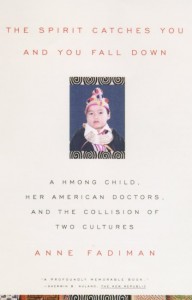 By Jae-Ha Kim
By Jae-Ha Kim
Cleveland Plain Dealer
September 21, 1997
With her first book The Spirit Catches You and You Fall Down, Anne Fadiman poignantly documents the head-on culture clash between a family of Hmong refugees from Laos and the American physicians who treat their infant child.
Each party wants whats best for the child. But neither is ready to acknowledge that whats foreign to them may be the best treatment for little Lia Lee.
Fadiman’s meticulously researched non-fiction book exudes passion and humanity without casting a disparaging eye at either the immigrant parents, who dont speak English, or the frustrated doctors who cant decipher the baby’s symptoms. When Fadiman writes of three-month-old Lias first visit to the Merced County, Calif., emergency room, she conveys the panic and fear of the parents who neither understand what has happened to their daughter or what the doctors expect from them.
Lia is misdiagnosed and mistreated before physicians are able to figure out that she has epilepsy.
The conflict that runs throughout the book isnt about whether science should prevail over ancient tradition, but of what happens when two very different cultures reach a point where neither seems to make any sense.
For instance, while the Hmong recognize epilepsy as a serious illness, they also regard it as a condition of honor. In fact, many Hmong epileptics become shamans–or txiv neebs–who heal the spirit.
The limited contact the Hmong had already had with Western medicine in … clinics had done little to instill confidence, especially when compared to the experiences with shamanistic healing to which they were accustomed, Fadiman writes. A txiv neeb might spend as much as eight hours in a sick persons home; doctors forced their patients, no matter how weak they were, to come to the hospital, and then might spend only twenty minutes at their bedsides. Txiv neebs were polite and never needed to ask questions; doctors asked many rude and intimate questions about patients lives, right down to their sexual and excretory habits.
Epilepsy, in Hmong, is referred to as quag dab peg, which translates in English to the spirit catches you and you fall down. The Lees believe Lia’s soul began to wander when her older sister slammed the door and frightened her spirit away.
While it wouldve been simple to portray the Lees as superstitious simpletons who were too uneducated to grasp the complexities of Western medicine, Fadiman proves to be non prejudicial. Yes, the Lees sacrificed chickens and pigs to help save Lias spirit. But then they butchered the animals for the feast held afterwards. Nothing went to waste.
There comes a moment when every parent must decide whether he or she should defy tradition or belief to save a child. The Spirit Catches You and You Fall Down conveys one familys story in a balanced, compelling way.





